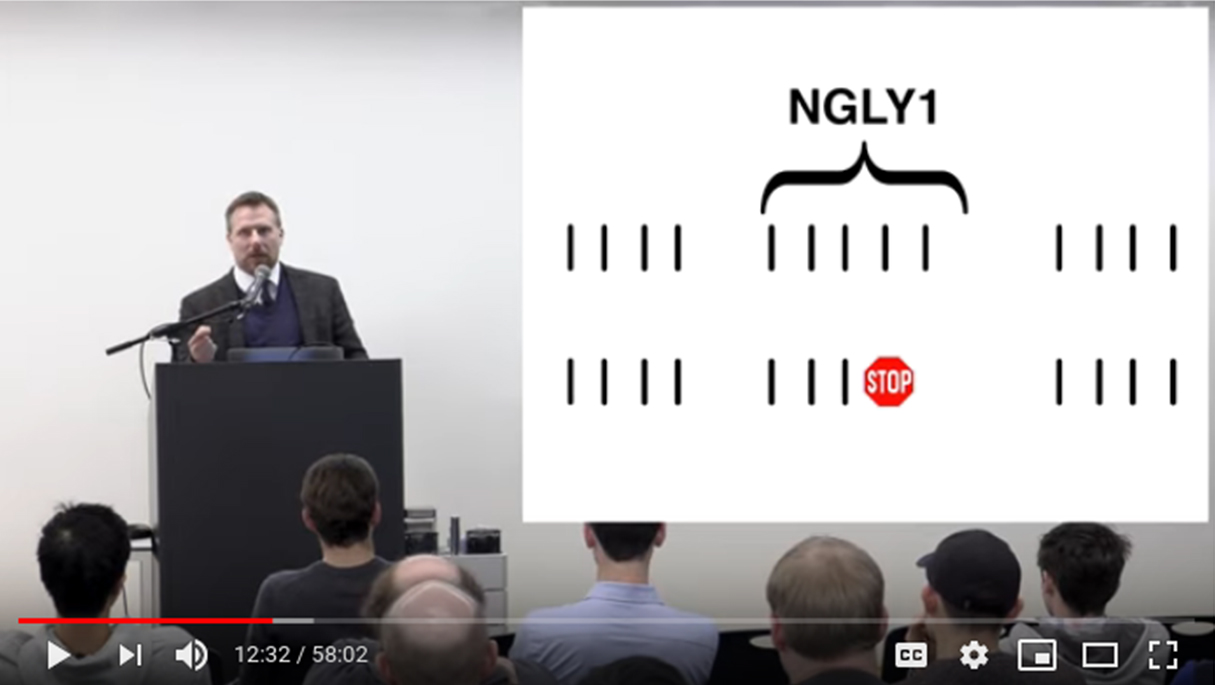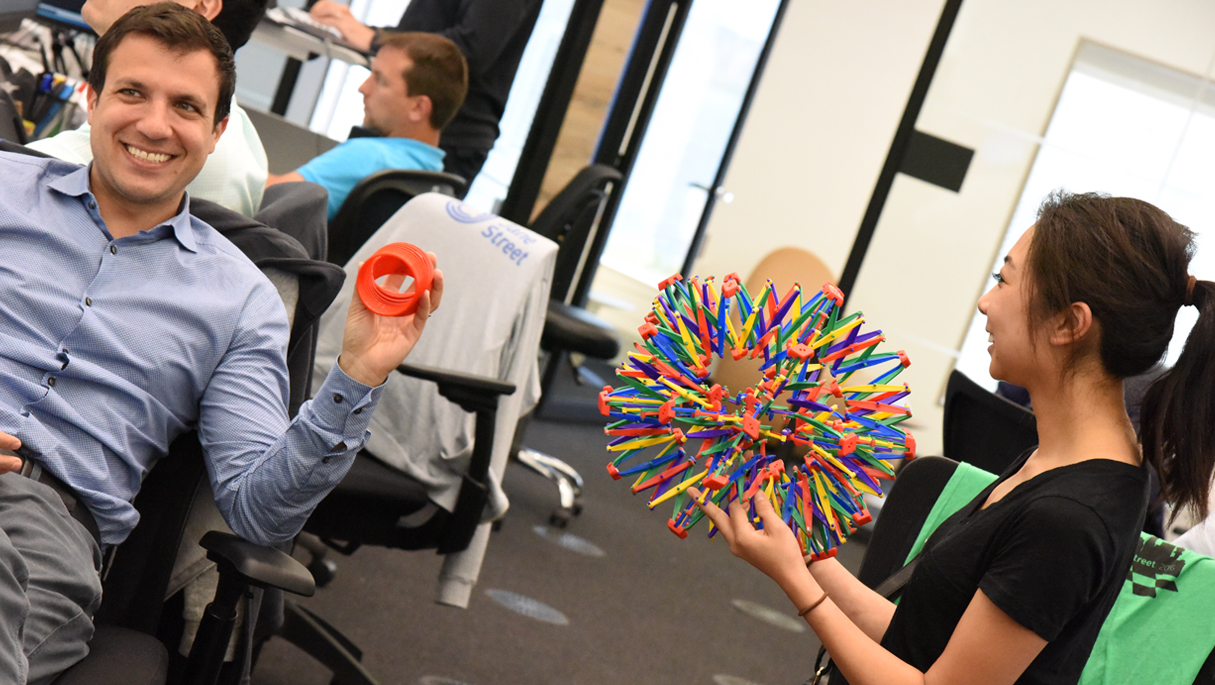
 All Episodes
All Episodes
Listen in on Jane Street’s Ron Minsky as he has conversations with engineers working on everything from clock synchronization to reliable multicast, build systems to reconfigurable hardware. Get a peek at how Jane Street approaches problems, and how those ideas relate to tech more broadly.
Why ML Needs a New Programming Language
with Chris Lattner
Episode 25 | September 3rd, 2025
Chris Lattner is the creator of LLVM and led the development of the Swift language at Apple. With Mojo, he’s taking another big swing: How do you make the process of getting the full power out of modern GPUs productive and fun? In this episode, Ron and Chris discuss how to design a language that’s easy to use while still providing the level of control required to write state of the art kernels. A key idea is to ask programmers to fully reckon with the details of the hardware, but making that work manageable and shareable via a form of type-safe metaprogramming. The aim is to support both specialization to the computation in question as well as to the hardware platform. “Somebody has to do this work,” Chris says, “if we ever want to get to an ecosystem where one vendor doesn’t control everything.”
The Thermodynamics of Trading
with Daniel Pontecorvo
Episode 24 | July 25th, 2025
Daniel Pontecorvo runs the “physical engineering” team at Jane Street. This group blends architecture, mechanical engineering, electrical engineering, and construction management to build functional physical spaces. In this episode, Ron and Dan go deep on the challenge of heat exchange in a datacenter, especially in the face of increasingly dense power demands—and the analogous problem of keeping traders cool at their desks. Along the way they discuss the way ML is changing the physical constraints of computing; the benefits of having physical engineering expertise in-house; the importance of monitoring; and whether you really need Apollo-style CO2 scrubbers to ensure your office gets fresh air.
Building Tools for Traders
with Ian Henry
Episode 23 | May 28th, 2025
Ian Henry started his career at Warby Parker and Trello, building consumer apps for millions of users. Now he writes high-performance tools for a small set of experts on Jane Street’s options desk. In this episode, Ron and Ian explore what it’s like writing code at a company that has been “on its own parallel universe software adventure for the last twenty years.” Along the way, they go on a tour of Ian’s whimsical and sophisticated side projects—like Bauble, a playground for rendering trippy 3D shapes using signed distance functions—that have gone on to inform his work: writing typesafe frontend code for users who measure time in microseconds and prefer their UIs to be “six pixels high.”
Finding Signal in the Noise: Machine Learning and the Markets
with In Young Cho
Episode 22 | March 10th, 2025
In Young Cho thought she was going to be a doctor but fell into a trading internship at Jane Street. Now she helps lead the research group’s efforts in machine learning. In this episode, In Young and Ron touch on the porous boundaries between trading, research, and software engineering, which require different sensibilities but are often blended in a single person. They discuss the tension between flexible research tools and robust production systems; the challenges of ML in a low-data, high-noise environment subject to frequent regime changes; and the shift from simple linear models to deep neural networks.
The Uncertain Art of Accelerating ML Models
with Sylvain Gugger
Episode 21 | October 14th, 2024
Sylvain Gugger is a former math teacher who fell into machine learning via a MOOC and became an expert in the low-level performance details of neural networks. He’s now on the ML-infra team at Jane Street, where he helps traders speed up their models. In this episode, Sylvain and Ron go deep on learning rate schedules; the subtle performance bugs PyTorch lets you write; how to keep a hungry GPU well-fed; and the importance of reproducibility in training runs. They also discuss some of the unique challenges of doing ML in the world of trading, like the unusual size and shape of market data and the need to do inference at very low latencies.
Solving Puzzles in Production
with Liora Friedberg
Episode 20 | October 7th, 2024
Liora Friedberg is a Production Engineer at Jane Street with a background in economics and computer science. In this episode, Liora and Ron discuss how production engineering blends high-stakes puzzle solving with thoughtful software engineering, as the people doing support build tools to make that support less necessary. They also discuss how Jane Street uses both tabletop simulation and hands-on exercises to train Production Engineers; what skills effective Production Engineers have in common; and how to create a culture where people aren’t blamed for making costly mistakes.
From the Lab to the Trading Floor: Designing for Expert Users
with Erin Murphy
Episode 19 | July 10th, 2024
Erin Murphy is a UX designer at Jane Street, and before that, she worked at NASA’s Jet Propulsion Laboratory building user interfaces for space missions. She’s also an illustrator with her own quarterly journal. In this episode, Erin and Ron discuss the challenge of doing user-centered design in an organization where experts are used to building tools for themselves. How do you bring a command-line interface to the web without making it worse for power users? They also discuss how beauty in design is more about utility than aesthetics; what Jane Street looks for in UX candidates; and how to help engineers discover what their users really want.
Performance Engineering on Hard Mode
with Andrew Hunter
Episode 18 | November 28th, 2023
Andrew Hunter likes making code go fast. Before joining Jane Street, he worked for seven years at Google on multithreaded architecture, and was a tech lead for tcmalloc, Google’s world-class scalable malloc implementation. In this episode, Andrew and Ron discuss how, paradoxically, in some ways it’s easier to optimize systems at hyperscale because of the impact that even miniscule changes can have. Finding performance wins in trading systems, which operate at a smaller scale, but which have bursty, low-latency workloads, is often trickier. Andrew explains how he approaches the problem, including his favorite profiling techniques and visualization tools; the unique challenges of optimizing OCaml versus C++; and when you should and shouldn’t care about nanoseconds. They also touch on the joys of musical theater, and how to pass an interview when you’re sleep-deprived.
A Poet's Guide to Product Management
with Peter Bogart-Johnson
Episode 17 | August 14th, 2023
Peter Bogart-Johnson was one of Jane Street’s first program managers, and helped bring the art of PMing—where that “P” variously stands for “project,” “product,” or some blend of the two—to the company at large. He’s also a poet and the former editor of a literary magazine. In this episode, Peter and Ron discuss the challenge of gaining trust as an outsider: how do you teach teams a new way of doing things while preserving what’s already working? The key, Peter says, is you listen; a good PM is an anthropologist. They also discuss how paying down technical debt isn’t something you do instead of serving customers; what Jane Street looks for in PM candidates; and how to help teams coordinate in times of great change.
The Future of Programming
with Richard Eisenberg
Episode 16 | May 17th, 2023
Richard Eisenberg is one of the core maintainers of Haskell. He recently joined Jane Street’s Tools and Compilers team, where he hacks on the OCaml compiler. He and Ron discuss the powerful language feature that got him into PL design in the first place—dependent types—and its role in a world where AIs can (somewhat) competently write your code for you. They also discuss the differences between Haskell and OCaml; the perils of trying to make a language that works for everybody; and how best a company like Jane Street can collaborate with the open source community.
Swapping the Engine out of a Moving Race Car
with Ella Ehrlich
Episode 15 | September 12th, 2022
Ella Ehrlich has been a developer at Jane Street for close to a decade. During much of that time, she’s worked on Gord, one of Jane Street’s oldest and most critical systems, which is responsible for normalizing and distributing the firm’s trading data. Ella and Ron talk about how to grow and modernize a legacy system without compromising uptime, why game developers are the “musicians of software,” and some of the work Jane Street has done to try to hire a more diverse set of software engineers.
State Machine Replication, and Why You Should Care
with Doug Patti
Episode 14 | April 20th, 2022
Doug Patti is a developer in Jane Street’s Client-Facing Tech team, where he works on a system called Concord that undergirds Jane Street’s client offerings. In this episode, Doug and Ron discuss how Concord, which has state-machine replication as its core abstraction, helps Jane Street achieve the reliability, scalability, and speed that the client business demands. They’ll also discuss Doug’s involvement in building a successor system called Aria, which is designed to deliver those same benefits to a much wider audience.
Memory Management
with Stephen Dolan
Episode 13 | January 5th, 2022
Stephen Dolan works on Jane Street’s Tools and Compilers team where he focuses on the OCaml compiler. In this episode, Stephen and Ron take a trip down memory lane, discussing how to manage computer memory efficiently and safely. They consider trade-offs between reference counting and garbage collection, the surprising gains achieved by prefetching, and how new language features like local allocation and unboxed types could give OCaml users more control over their memory.
What is an Operating System?
with Anil Madhavapeddy
Episode 12 | November 3rd, 2021
Anil Madhavapeddy is an academic, author, engineer, entrepreneur, and OCaml aficionado. In this episode, Anil and Ron consider the evolving role of operating systems, security on the internet, and the pending arrival (at last!) of OCaml 5.0. They also discuss using Raspberry Pis to fight climate change; the programming inspiration found in British pubs and on Moroccan beaches; and the time Anil went to a party, got drunk, and woke up with a job working on the Mars Polar Lander.
Building a UI Framework
with Ty Overby
Episode 11 | October 6th, 2021
Ty Overby is a programmer in Jane Street’s web platform group where he works on Bonsai, our OCaml library for building interactive browser-based UIs. In this episode, Ty and Ron consider the functional approach to building user interfaces. They also discuss Ty’s programming roots in Neopets, what development features they crave on the web, the unfairly maligned CSS, and why Excel is “arguably the greatest programming language ever developed.”
Writing, Technically
with James Somers
Episode 10 | September 1st, 2021
James Somers is Jane Street’s writer-in-residence, splitting his time between English and OCaml, and helping to push forward all sorts of efforts around knowledge-sharing at Jane Street. In this episode, James and Ron talk about the role of technical writing in an organization like Jane Street, and how engineering software relates to editing prose.
More Signals & Threads coming soon!
with Ron Minsky
August 24th, 2021
Signals & Threads is back, and we have a fun season of topics lined up. We hope you’ll join us! The first episode drops September 1st.
An inside look at Jane Street's tech internship
with Jeanne Van Briesen, Matt Else, and Grace Zhang
Episode 9 | November 4th, 2020
In this week's episode, the season 1 finale, Ron speaks with Jeanne, Matt, and Grace, three former tech interns at Jane Street who have returned as full-timers. They talk about the experience of being an intern at Jane Street, the types of projects that interns work on, and how they've found the transition to full-time work.
Building a functional email server
with Dominick LoBraico
Episode 8 | October 28th, 2020
Despite a steady stream of newcomers, email still reigns supreme as the chief communication mechanism for the Information Age. At Jane Street, it’s just as critical as anywhere, but there’s one difference: the system at the heart of our email infrastructure is homegrown. This week, Ron talks to Dominick LoBraico, an engineer working on Jane Street’s technology infrastructure, about how and why we built Mailcore, an email server written and configured in OCaml. They delve into questions around how best to represent the configuration of a complex system, when you should build your own and when you shouldn’t, and the benefits of bringing a code-focused approach to solving systems problems.
Language Design
with Leo White
Episode 7 | October 21st, 2020
Equal parts science and art, programming language design is very much an unsolved problem. This week, Ron speaks with Leo White, from Jane Street's Tools & Compilers team, about cutting-edge language features, future work happening on OCaml, and Jane Street's relationship with the broader open-source community. The conversation covers everything from the paradox of language popularity, to advanced type system features like modular implicits and dependent types. Listen in, no programming languages PhD required!
Clock Synchronization
with Chris Perl
Episode 6 | October 14th, 2020
Clock synchronization, keeping all of the clocks on your network set to the “correct” time, sounds straightforward: our smartphones sure don’t seem to have trouble with it. Next, keep them all accurate to within 100 microseconds, and prove that you did -- now things start to get tricky. In this episode, Ron talks with Chris Perl, a systems engineer at Jane Street about the fundamental difficulty of solving this problem at scale and how we solved it.
Python, OCaml, and Machine Learning
with Laurent Mazare
Episode 5 | October 7th, 2020
A conversation with Laurent Mazare about how your choice of programming language interacts with the kind of work you do, and in particular about the tradeoffs between Python and OCaml when doing machine learning and data analysis. Ron and Laurent discuss the tradeoffs between working in a text editor and a Jupyter Notebook, the importance of visualization and interactivity, how tools and practices vary between language ecosystems, and how language features like borrow-checking in Rust and ref-counting in Swift and Python can make machine learning easier.
Compiler Optimization
with Greta Yorsh
Episode 4 | September 30th, 2020
It’s a software engineer’s dream: A compiler that can take idiomatic high-level code and output maximally efficient instructions. Ron’s guest this week is Greta Yorsh, who has worked on just that problem in a career spanning both industry and academia. Ron and Greta talk about some of the tricks that compilers use to make our software faster, ranging from feedback-directed optimization and super-optimization to formal analysis.
Multicast and the Markets
with Brian Nigito
Episode 3 | September 23rd, 2020
Electronic exchanges like Nasdaq need to handle a staggering number of transactions every second. To keep up, they rely on two deceptively simple-sounding concepts: single-threaded programs and multicast networking. In this episode, Ron speaks with Brian Nigito, a 20-year industry veteran who helped build some of the earliest electronic exchanges, about the tradeoffs that led to the architecture we have today, and how modern exchanges use these straightforward building blocks to achieve blindingly fast performance at scale.
Build Systems
with Andrey Mokhov
Episode 2 | September 16th, 2020
Most software engineers only think about their build system when it breaks; and yet, this often unloved piece of software forms the backbone of every serious project. This week, Ron has a conversation with Andrey Mokhov about build systems, from the venerable Make to Bazel and beyond. Andrey has a lot of experience in this field, including significant contributions to the replacement for the Glasgow Haskell Compiler’s Make-based system and Build Systems à la carte, a paper that untangles the complex ecosystem of existing build systems. Ron and Andrey muse on questions like why every language community seems to have its own purpose-built system and, closer to home, where Andrey and the rest of the build systems team at Jane Street are focusing their efforts.
Programmable Hardware
with Andy Ray
Episode 1 | September 9th, 2020
The ever-widening availability of FPGAs has opened the door to solving a broad set of performance-critical problems in hardware. In this episode, Ron speaks with Andy Ray, who leads Jane Street’s hardware design team. Andy has a long career prior to Jane Street shipping hardware designs for things like modems and video codecs. That work led him to create Hardcaml, a domain-specific language for expressing hardware designs. Ron and Andy talk about the current state-of-the-art in hardware tooling, the economics of FPGAs, and how the process of designing hardware can be improved by applying lessons from software engineering.
Hardcaml itself is open-source software available on Github, along with a collection of associated libraries and tools. Andy has also given a talk on Hardcaml called OCaml All The Way Down, and has a post on Jane Street's blog about some of the testing techniques used with Hardcaml.
Introducing Signals and Threads
with Ron Minsky
September 2nd, 2020





